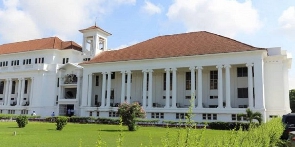The Supreme Court of Ghana has unanimously declared the law that allowed the government to impose Covid-19 restrictions unconstitutional.
The Imposition of Restrictions Act, passed by Parliament in 2020, granted the government the power to impose restrictions in the interest of public health and safety during the pandemic.
Under this law, the president had the authority to restrict public gatherings, close schools, and implement measures to regulate religious gatherings, among other actions.
However, Law Professor and Human Rights advocate Kwadwo Appiagyei-Atua and eight others challenged the constitutionality of the law, arguing that it granted the president excessive powers to suspend fundamental human rights without adequate oversight from the judiciary and Parliament.
A seven-member panel led by Justice Jones Dotse agreed with this argument, ruling that the Imposition of Restrictions Act is inconsistent with the Constitution. The court declared the law unconstitutional, null, and void. The full reasons for the ruling will be made available on June 7.
The panel of justices involved in the case included Justice Jones Dotse, Nene Amegatcher, Nii Ashie Kotey, Lovelace Johnson, Amadu Tanko, Prof Henrietta Mensah Bonsu, and Emmanuel Kulendi.
This landmark decision by the Supreme Court highlights the importance of upholding constitutional principles and ensuring that fundamental human rights are protected, even in times of crisis. The ruling will have significant implications for the management of future emergencies and the balance between governmental powers and individual freedoms in Ghana.
You can also watch the latest episode of People & Places on GhanaWeb TV:
YNA/WA
General News of Wednesday, 31 May 2023
Source: www.ghanaweb.com

















